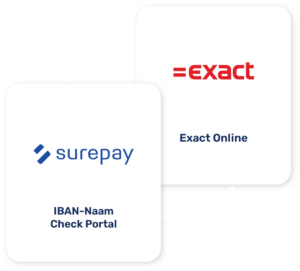Why is a SurePay Exact link so easy and valuable?

There is an increasing focus on fraud. Yet we do not always see improvements in payment verification or security. What is going on? And don’t many companies overlook the most obvious solution?
Increasing fraud and attention to fraud
The number of fraud cases has increased dramatically in recent years. And the scale of fraud is also often huge. When so much money is involved, there will naturally be more focus on it. Yet in practice, we do not yet see everything being done to prevent fraud. This is regularly due to the fact that people do not fully grasp how these frauds work.
We often think that hackers need to perform hugely complicated digital feats before they can steal anything. But that is by no means always true. Take, for example, the illegal platform Genesis Market. There, stolen personal data was offered on an ongoing basis. Fraudsters could buy login details there for as little as a small amount and then try to make money from this in an improper way.
For example, with one set of login credentials, someone can log into a business mail account and send emails on behalf of someone else. For example, to payroll to change an account number. The next salary is then transferred directly to the fraudster’s account number, without anyone directly noticing.
If such a simple action can lead to major damages, you may wonder if our payment methods are safe enough.
Can't the accountant play a (bigger) role in this?
In the Netherlands, the auditor performs checks on the correctness of payments, among other things. Many companies expect that any abuses will be addressed during the (annual) audit. Yet this is far from always the case. It is much more often whistleblowers, tip-offs or simple coincidence that brings wrongdoing to the surface. It seems, therefore, that accountants do too little to detect, or prevent, fraud.
A new survey by the AFM also shows that audit firms often fail to detect fraud. Meanwhile, accountancy firms are doing as much as they can to improve this, but the results are currently lacking. A watertight method also seems almost unfeasible at a time when digital technologies are also ensuring that fraudsters have all sorts of new options to steal money. But meanwhile, a digital check in particular can also ensure that frauds are minimised by simply detecting them in advance. Probably many companies (still) overlook the digital check of records and payments, while it can be implemented directly in any accounting system.
Exact coupling offers solution
With the SurePay Exact connection companies can instantly perform an IBAN Name Check on all their payments. This is an important step in preventing fraud, even though it may not seem significant at first. With the SurePay link, an alarm immediately goes off when the name and account number are incorrect on a payout. In private payments, we have long been used to the bank immediately signalling if the name does not match the account number entered. This prevents numerous frauds and errors on a daily basis.
But, for payments made by companies, banks often cannot perform an IBAN Name Check. This is mainly due to the fact that companies often pay in batches.
At the same time, it is also precisely (large) companies that are very vulnerable to fraud. On the one hand, because much more money can often be captured there. But also because there is much less overview of all the processes, customers, suppliers and employees. Therefore, organisations do well to check their records and keep them up to date
With the Exact link, you link your accounts to the SurePay portal in no time. Any errors and discrepancies are immediately spotted and corrected. This also helps companies avoid fraud and errors and saves significant costs. The SurePay IBAN Name Check has since more than proven itself. All Dutch banks use this technique for individual payments and billions of checks have already been made in recent years. This seemingly simple link, in practice, can prevent a lot of damage and even some of the most complex frauds.